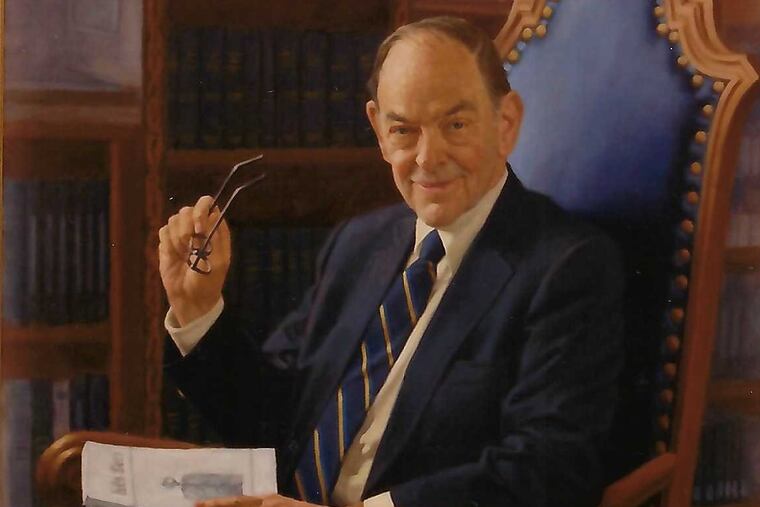Arthur K. Asbury, pioneering neurologist, interim dean, and professor emeritus at Penn, has died at 93
His research in the 1960s on Guillain-Barré syndrome set the stage for future advances. His favorite job was mentor, and Penn honors him with the Arthur K. Asbury Award for outstanding mentoring.

Arthur K. Asbury, 93, of Philadelphia, pioneering neurologist, enthusiastic mentor, and interim dean, vice dean, retired chair of neurology, and professor emeritus at the University of Pennsylvania, died Wednesday, Oct. 19, of prostate cancer and dementia at Penn Hospice Rittenhouse.
An award-winning expert known around the world for his early work on Guillain-Barré syndrome, Dr. Asbury focused on neuromuscular diseases during his 60-year career and served in clinical, research, educational, and leadership roles at Penn, the University of California San Francisco, Harvard University, and their affiliated hospitals.
His early research in the 1960s about the damage caused to peripheral nerves by Guillain-Barré was groundbreaking, and subsequent research and treatment are built on that information. He was collaborative and inquisitive, and served on national committees and teams that examined, among other things, the side effects of early swine flu vaccines, a Guillain-Barré epidemic in China, and diagnostic criteria for Guillain-Barré.
He chaired Penn’s neurology department from 1974 to 1982 and later was simultaneously interim dean of the medical school, now the Perelman School of Medicine, and executive vice president of the medical system. He was also the medical school’s first Van Meter professor of neurology and vice dean of both research and faculty affairs.
Before Penn, he spent 1969 to 1973 as professor and vice chair of neurology at UC San Francisco, and chief of neurology service at San Francisco VA Hospital.
Closest to his heart was his role as teacher and mentor, and Penn established the Arthur K. Asbury Award for outstanding faculty mentoring in 2004. More than simply a supervisor, he invited residents to Phillies games and other fun events and wrote clever rhymes about them when they graduated that all started with: “It is ill-timed rhyme/Scribbled in haste/Unrehearsed verse/ In the worst possible taste.”
He published and edited hundreds of scientific papers and book chapters, was editor-in-chief of the Annals of Neurology for eight years, and served on a dozen editorial boards. He lectured as a visiting professor around the world and was an enthusiastic and effective fund-raiser and recruiter for Penn.
He was a fellow, trustee, and executive for many professional organizations and past president of the American Neurological Association, the Philadelphia Neurological Society, and the College of Physicians of Philadelphia. Among his many honors are the World Federation of Neurology’s Lifetime Achievement Award and Penn’s I.S. Ravdin Master Clinician Award and the Lindback Award for teaching excellence.
» READ MORE: His wife remembers Dr. Asbury in this touching tribute
At 85, Dr. Asbury was still participating in project meetings at Penn, and writer David Woods said in a 2014 online story for the College of Physicians of Philadelphia: “Art Asbury is what is known in thoroughbred racing circles as a stayer.”
Born to two physicians on Nov. 22, 1928, in Cincinnati, Arthur Knight Asbury grew up at historic Forest Retreat, a thoroughbred horse farm in Carlisle, Ky., that bred Determine, the winner of the 1954 Kentucky Derby.
He graduated from Phillips Academy in Andover, Mass., and earned a bachelor’s degree in agriculture from the University of Kentucky in 1951. He was active in the U.S. Army Reserve from 1951 to 1953, and graduated first in his class from the University of Cincinnati College of Medicine in 1958.
He served his internship and residency at Massachusetts General Hospital, and held research and clinical fellowships at the hospital and Harvard Medical School from 1963 to 1965. He married Patricia Armstrong, and they had daughters Dana and Lyndia and son Will.
After a divorce, he met Carolyn Holstein at a medical meeting, and they married in 1980 and lived in Center City and Naval Square. In 2019, they established the Arthur Knight Asbury, MD Professorship for Penn’s chair of neurology.
Dr. Asbury skied, played tennis and golf, and had season tickets to the Phillies. He enjoyed the Philadelphia Orchestra, and he and his family vacationed in Maine.
He often worked late and on Saturdays, and his daughter, Dana, recalls him dozing at the dinner table and the numerous jars of animal brains she discovered at his hospital lab. When asked by David Woods in 2014 how he saw his life’s work, Dr. Asbury said: “I work at making friends.”
“He knew how to be a good friend,” his wife said. “He was kind, smart, curious, and humble. He had a wonderful sense of humor, and he always found time for his family and career.”
In addition to his wife and children, Dr. Asbury is survived by two grandchildren, three great-grandchildren, a sister, and other relatives. A brother and his former wife died earlier.
A celebration of his life is to be held later.
Donations in his name may be made to the GBS-CIDP Foundation International, 375 East Elm St., Suite 101, Conshohocken, Pa. 19428; Penn Medicine Hospice Services, 150 Monument Rd., Suite 300, Bala Cynwyd, Pa. 19004; and the Arthur K. Asbury Accelerator Fund, Penn Medicine Development, 3535 Market St., Suite 750, Philadelphia, Pa. 19104.